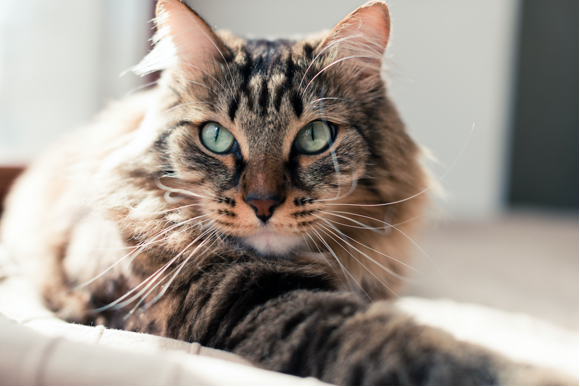Dog blood saves cat’s life before opening of new feline blood bank

Russian Blue cat Rex has been given a life-saving blood transfusion from a greyhound called Alice, who is normally not a friend of cats.
Vets at the University of Melbourne’s U-Vet Hospital said the emergency transfusion highlights the need to have cat blood on hand for cats like Rex, who would have died waiting an hour for the next available feline donor.
The U-Vet Hospital is now urgently seeking donors for its new cat blood bank, launched 1 June 2018.
Blood Donor Program Coordinator Kerry Bozicevic said cats require emergency blood transfusions in the same way humans do.
“If a cat loses blood due to trauma, surgery, immune system diseases, cancer or has a blood clotting disorder, it may require a blood transfusion to survive and to return to a meaningful life,” Mrs Bozicevic said.
“In Rex’s case he had eaten rat poison which made him bleed and lose a lot of blood. Rex went into shock, collapsed and stopped breathing. Only an immediate blood transfusion could save his life. We located a feline blood donor, but she was an hour away, so the only option left was to give dog blood readily available from our blood bank in the meantime.”
This last resort measure of giving blood from one species to another species is known as a xenotransfusion, where ‘xeno’ means foreign.
When no other options are available, and the patient will die without an immediate transfusion, a cat can receive a transfusion of dog blood – but it is not a long-term solution and the risks are not completely understood.
“The cat’s immune system will destroy the dog blood over just a few days, so the cat patient will still need a feline blood donation as soon as possible,” Ms Bozicevic said.
“Cats have three blood types – A, B and AB. Type A is the most frequent type with B being less frequent and AB very rare. Rex had the less common blood type B.”
“Like humans, cats have specific blood types, so we need to have blood of the correct blood type on hand to give a compatible transfusion. Otherwise they can develop severe life-threatening reactions when their immune system attacks the donor blood.”
After his transfusion of dog blood, Rex started breathing on his own again, his pulse stabilised and he regained consciousness.
The dog blood was donated by Alice, a three-year-old Greyhound.
Alice is a regular blood donor, who is always accompanied by her older housemate Jimmy, the Golden Retriever. While Alice does normally not get along well with cats, she ironically gave Rex, the cat, the biggest gift: life.
Rex received a feline blood transfusion from feline blood generously donated by Dorothy, a one-year-old female Domestic Medium Hair cat that is one of the few donors that has blood type B.
“After a month of medication, Rex is recovered and doing well,” Ms Bozicevic said.
With the new capability to store cat blood for immediate life-saving transfusion, U-Vet now meets the highest standards for feline emergency and critical care.
Each blood donation is separated into its red blood cell component and its plasma component.
This allows the most efficient use the of blood donation, with red blood cells given to those cats that have a very low red blood cell count and the plasma component given to cats that are bleeding due to blood clotting issues.
“One blood donation can potentially save the lives of two cats,” Mrs Bozicevic said.
The U-Vet Feline Blood Bank collects blood from cats kept as pets and volunteered for donation by their owners.
Donating cats need to be:
- Between one and five years of age
- Four kg or more in weight
- Healthy with a calm temperament
- Up to date with vaccinations and parasite control
- A Victorian resident (never travelled out of the state)
- Not a blood transfusion recipient.
All potential donor cats are tested to make sure that it is safe for them to donate blood and that their blood is of the highest quality.
In the blood bank, red blood cells can be stored for 35 days and plasma for up to three years.
For further information email UOM-Blood-Donor-Program@unimelb.edu.au
U-Vet Werribee Animal Hospital is home to one of the first centres for veterinary emergency and critical care in the country. Its emergency room is staffed to see sick pets 24 hours, every day of the year, with about 5000 patients annually.